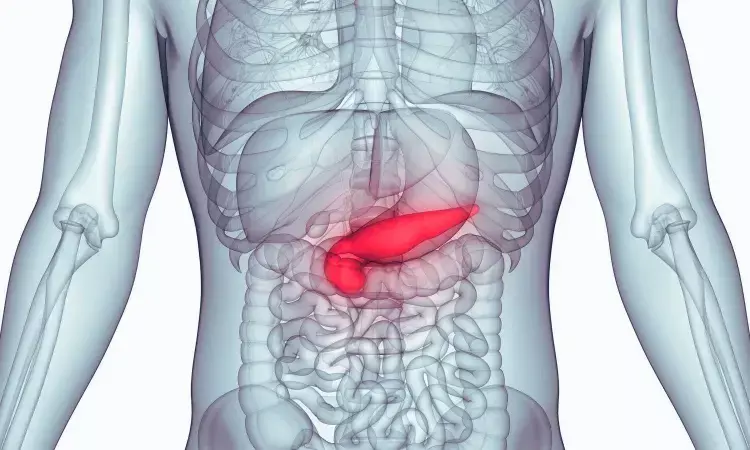- Home
- Medical news & Guidelines
- Anesthesiology
- Cardiology and CTVS
- Critical Care
- Dentistry
- Dermatology
- Diabetes and Endocrinology
- ENT
- Gastroenterology
- Medicine
- Nephrology
- Neurology
- Obstretics-Gynaecology
- Oncology
- Ophthalmology
- Orthopaedics
- Pediatrics-Neonatology
- Psychiatry
- Pulmonology
- Radiology
- Surgery
- Urology
- Laboratory Medicine
- Diet
- Nursing
- Paramedical
- Physiotherapy
- Health news
- Fact Check
- Bone Health Fact Check
- Brain Health Fact Check
- Cancer Related Fact Check
- Child Care Fact Check
- Dental and oral health fact check
- Diabetes and metabolic health fact check
- Diet and Nutrition Fact Check
- Eye and ENT Care Fact Check
- Fitness fact check
- Gut health fact check
- Heart health fact check
- Kidney health fact check
- Medical education fact check
- Men's health fact check
- Respiratory fact check
- Skin and hair care fact check
- Vaccine and Immunization fact check
- Women's health fact check
- AYUSH
- State News
- Andaman and Nicobar Islands
- Andhra Pradesh
- Arunachal Pradesh
- Assam
- Bihar
- Chandigarh
- Chattisgarh
- Dadra and Nagar Haveli
- Daman and Diu
- Delhi
- Goa
- Gujarat
- Haryana
- Himachal Pradesh
- Jammu & Kashmir
- Jharkhand
- Karnataka
- Kerala
- Ladakh
- Lakshadweep
- Madhya Pradesh
- Maharashtra
- Manipur
- Meghalaya
- Mizoram
- Nagaland
- Odisha
- Puducherry
- Punjab
- Rajasthan
- Sikkim
- Tamil Nadu
- Telangana
- Tripura
- Uttar Pradesh
- Uttrakhand
- West Bengal
- Medical Education
- Industry
Nearly Half of Acute Pancreatitis Patients Develop De Novo Diabetes, Study Finds

Serbia: A recent study has highlighted the high incidence of de novo diabetes mellitus (DM) among patients hospitalized with acute pancreatitis (AP) and its strong association with disease severity and outcomes.
Published in The American Journal of Surgery, the research was conducted by Dr. Prishita Banerji and Dr. Yajjat Garg from the Department of Digestive Surgery, Clinical Centre Niš, University of Niš Faculty of Medicine, Serbia.
The retrospective cohort study included 91 patients admitted with AP between January 2022 and December 2023. Follow-up continued until November 2024 to monitor the development of new-onset diabetes.
The following were the key findings of the study:
- Approximately 43% of patients developed de novo diabetes following acute pancreatitis (AP).
- Among patients with de novo diabetes, 67% required insulin therapy.
- Twenty-eight percent of diabetic patients were managed with oral antidiabetic medications.
- Around 5% of patients were able to discontinue diabetes treatment during follow-up.
- Severe AP was observed in 43% of patients.
- Nearly one-third (31%) of patients with severe AP required intensive care unit (ICU) support.
- About 6.5% of patients underwent necrosectomy for pancreatic necrosis.
- Four patients died due to complications during hospitalization.
- Most cases of de novo diabetes occurred in patients with pancreatic necrosis, highlighting the link between structural pancreatic damage and endocrine dysfunction.
The researchers emphasized the importance of early endocrine monitoring for patients with AP, particularly those with severe disease or requiring ICU care. Identifying individuals at high risk for developing diabetes can facilitate timely intervention, optimize glycemic control, and potentially reduce long-term complications.
The study’s findings suggest that AP severity is the strongest predictor of both diabetes development and adverse outcomes, including ICU admission and mortality. With the potential for progression from de novo diabetes to chronic diabetes mellitus, long-term follow-up and screening are essential for all patients who experience an episode of AP.
Dr. Banerji and Dr. Garg concluded that de novo diabetes mellitus represents a common and serious complication of acute pancreatitis. Implementing routine diabetes screening after an AP episode can help clinicians identify high-risk patients early, guide management strategies, and improve long-term metabolic outcomes. The study underscores the need for heightened awareness among healthcare providers about the endocrine consequences of pancreatic inflammation and the importance of proactive monitoring in affected patients.
"By linking disease severity to diabetes risk, this research provides valuable insight into patient management strategies following AP and highlights the necessity of integrating endocrine assessment into standard care protocols for these patients," the authors wrote.
Reference:
Banerji, P., & Garg, Y. (2025). THE INCIDENCE OF “DE-NOVO” DIABETES MELLITUS IN PATIENTS WITH ACUTE PANCREATITIS AND ITS ASSOCIATION WITH OUTCOME AND SEVERITY. The American Journal of Surgery, 116663. https://doi.org/10.1016/j.amjsurg.2025.116663
Dr Kamal Kant Kohli-MBBS, DTCD- a chest specialist with more than 30 years of practice and a flair for writing clinical articles, Dr Kamal Kant Kohli joined Medical Dialogues as a Chief Editor of Medical News. Besides writing articles, as an editor, he proofreads and verifies all the medical content published on Medical Dialogues including those coming from journals, studies,medical conferences,guidelines etc. Email: drkohli@medicaldialogues.in. Contact no. 011-43720751
Next Story


